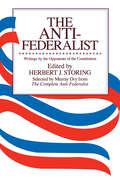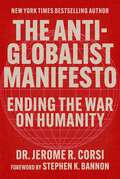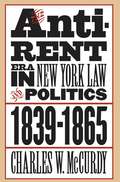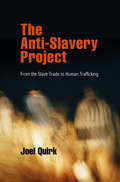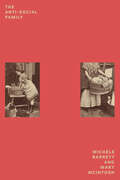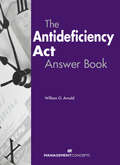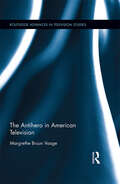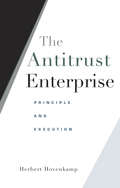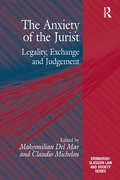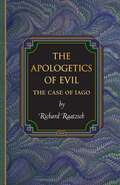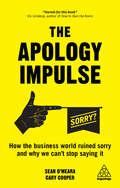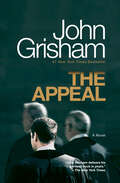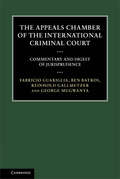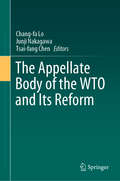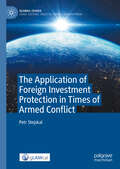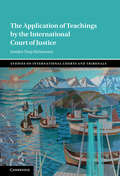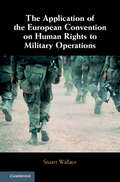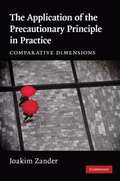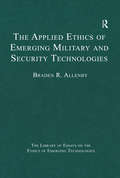- Table View
- List View
The Anti-Federalist: An Abridgment of The Complete Anti-Federalist
by Herbert J. StoringHerbert J. Storing's Complete Anti-Federalist, hailed as "a civic event of enduring importance" (Leonard W. Levy, New York Times Book Review), indisputably established the importance of the Anti-Federalists' writings for our understanding of the Constitution. As Storing wrote in his introduction, "If the foundation of the American polity was laid by the Federalists, the Anti-Federalist reservations echo through American history; and it is in the dialogue, not merely in the Federalist victory, that the country's principles are to be discovered." This one-volume edition presents the essence of the other side of that crucial dialogue. It can be read as a genuine counterpart to the Federalist Papers; as an original source companion to Storing's brilliant essay What the Anti-Federalists Were For (volume I of The Complete Anti-Federalist, available as a separate paperback); or as a guide to exploring the full range of Anti-Federalist writing. The Anti-Federalist makes a fundamental source of our political heritage accessible to everyone.
The Anti-Globalist Manifesto: Ending the War on Humanity
by Jerome R. CorsiIn his new book, The Anti-Globalist Manifesto: Ending the War on Humanity, bestselling author Jerome Corsi puts out a call for action to reverse the totalitarian goals of the New World Order globalists. Corsi addresses that these demons are well advanced in their planned &“One World Government&” takeover aimed at establishing an atheistic utopia that will have no respect for traditional human rights. Comfortable that their transhuman aspirations are achievable, the Malthusian elite is waging a war on humanity that embraces global depopulation as a means of preventing Earth's abundant natural resources for themselves. Tracing this dystopian nightmare back to the assassination of President John F. Kennedy on November 23, 1963, as the day the deep state went rogue in a conspiracy involving the CIA, the Pentagon, the State Department, and the Department of Justice to affect a coup d'état that would allow the military industrial complex to go to war in Vietnam, the deep state has created an ongoing Truman Show—a series of never-ending psychological operations designed to induce citizens worldwide to surrender freedoms to government in return for security. With the premise that the globalist elite uses systems of mass manipulation and social engineering to induce the world's population to accept the implementation of the "reforms" it has already decided to implement, Corsi sets a detailed plan for organizing global resistance against the subversives who now sit at the top of the institutions or world government and finance.The Anti-Globalist Manifesto is a call to action to restore God to our lives, as those of us fighting for a return to personal freedoms and limited government, ending the war on humanity and driving once and for all time the New World Order globalists back to Hell where they belong.
The Anti-Oligarchy Constitution: Reconstructing the Economic Foundations of American Democracy
by William E. Forbath Joseph FishkinA bold call to reclaim an American tradition that argues the Constitution imposes a duty on government to fight oligarchy and ensure broadly shared wealth. Oligarchy is a threat to the American republic. When too much economic and political power is concentrated in too few hands, we risk losing the “republican form of government” the Constitution requires. Today, courts enforce the Constitution as if it has almost nothing to say about this threat. But as Joseph Fishkin and William Forbath show in this revolutionary retelling of constitutional history, a commitment to prevent oligarchy once stood at the center of a robust tradition in American political and constitutional thought. Fishkin and Forbath demonstrate that reformers, legislators, and even judges working in this “democracy of opportunity” tradition understood that the Constitution imposes a duty on legislatures to thwart oligarchy and promote a broad distribution of wealth and political power. These ideas led Jacksonians to fight special economic privileges for the few, Populists to try to break up monopoly power, and Progressives to fight for the constitutional right to form a union. During Reconstruction, Radical Republicans argued in this tradition that racial equality required breaking up the oligarchy of slave power and distributing wealth and opportunity to former slaves and their descendants. President Franklin Roosevelt and the New Dealers built their politics around this tradition, winning the fight against the “economic royalists” and “industrial despots.” But today, as we enter a new Gilded Age, this tradition in progressive American economic and political thought lies dormant. The Anti-Oligarchy Constitution begins the work of recovering it and exploring its profound implications for our deeply unequal society and badly damaged democracy.
The Anti-Rent Era in New York Law and Politics, 1839-1865
by Charles W. MccurdyA compelling blend of legal and political history, this book chronicles the largest tenant rebellion in U.S. history. From its beginning in the rural villages of eastern New York in 1839 until its collapse in 1865, the Anti-Rent movement impelled the state's governors, legislators, judges, and journalists, as well as delegates to New York's bellwether constitutional convention of 1846, to wrestle with two difficult problems of social policy. One was how to put down violent tenant resistance to the enforcement of landlord property and contract rights. The second was how to abolish the archaic form of land tenure at the root of the rent strike.Charles McCurdy considers the public debate on these questions from a fresh perspective. Instead of treating law and politics as dependent variables--as mirrors of social interests or accelerators of social change--he highlights the manifold ways in which law and politics shaped both the pattern of Anti-Rent violence and the drive for land reform. In the process, he provides a major reinterpretation of the ideas and institutions that diminished the promise of American democracy in the supposed "golden age" of American law and politics.
The Anti-Slavery Project
by Joel QuirkIt is commonly assumed that slavery came to an end in the nineteenth century. While slavery in the Americas officially ended in 1888, millions of slaves remained in bondage across Africa, Asia, and the Middle East well into the first half of the twentieth century. Wherever laws against slavery were introduced, governments found ways of continuing similar forms of coercion and exploitation, such as forced, bonded, and indentured labor. Every country in the world has now abolished slavery, yet millions of people continue to find themselves subject to contemporary forms of slavery, such as human trafficking, wartime enslavement, and the worst forms of child labor. The Anti-Slavery Project: From the Slave Trade to Human Trafficking offers an innovative study in the attempt to understand and eradicate these ongoing human rights abuses.In The Anti-Slavery Project, historian and human rights expert Joel Quirk examines the evolution of political opposition to slavery from the mid-eighteenth century to the present day. Beginning with the abolitionist movement in the British Empire, Quirk analyzes the philosophical, economic, and cultural shifts that eventually resulted in the legal abolition of slavery. By viewing the legal abolition of slavery as a cautious first step--rather than the end of the story--he demonstrates that modern anti-slavery activism can be best understood as the latest phase in an evolving response to the historical shortcomings of earlier forms of political activism.By exposing the historical and cultural roots of contemporary slavery, The Anti-Slavery Project presents an original diagnosis of the underlying causes driving one of the most pressing human rights problems in the world today. It offers valuable insights for historians, political scientists, policy makers, and activists seeking to combat slavery in all its forms.
The Anti-Social Family (Radical Thinkers)
by Michèle Barrett Mary McIntoshDespite much talk of its decline, the nuclear family persists as a structure central to contemporary society, a fact to be lamented, according to the ideas of Michèle Barrett and Mary McIntosh. The Anti-social Family dissects the network of household, kinship and sexual relations that constitute the family form in advanced capitalist societies to show how they reinforce conditions of inequality. This classic work explores the personal and social needs that the family promises to meet but more often denies, and proposes moral and political practices for more egalitarian caring alternatives.
The Antideficiency Act Answer Book
by William G. Arnold CCFM-A, CCAAvoid Violations of the Antideficiency Act!Antideficiency Act (ADA) violations within both the financial and audit communities are now at an all-time high. Violations often result from a lack of knowledge about what is and what is not permissible under the law. The Antideficiency Act Answer Book is an easy-to-understand question-and-answer tool that guides you through all the rules associated with the Antideficiency Act and helps you detect and report violations in a timely manner.• Covers all aspects of the Antideficiency Act, from its history to common violations, penalties for violation, and reporting requirements• Includes the tools you need to help avoid Antideficiency Act violations• Plus! Includes an analysis of all the ADA reports collected by the Government Accountability Office, summarized by agency, appropriation, amount, and type of violation.
The Antihero in American Television (Routledge Advances in Television Studies)
by Margrethe Bruun VaageThe antihero prevails in recent American drama television series. Characters such as mobster kingpin Tony Soprano (The Sopranos), meth cook and gangster-in-the-making Walter White (Breaking Bad) and serial killer Dexter Morgan (Dexter) are not morally good, so how do these television series make us engage in these morally bad main characters? And what does this tell us about our moral psychological make-up, and more specifically, about the moral psychology of fiction? Vaage argues that the fictional status of these series deactivates rational, deliberate moral evaluation, making the spectator rely on moral emotions and intuitions that are relatively easy to manipulate with narrative strategies. Nevertheless, she also argues that these series regularly encourage reactivation of deliberate, moral evaluation. In so doing, these fictional series can teach us something about ourselves as moral beings—what our moral intuitions and emotions are, and how these might differ from deliberate, moral evaluation.
The Antitrust Enterprise: Principle and Execution
by Herbert HovenkampAfter thirty years, the debate over antitrust's ideology has quieted. Most now agree that the protection of consumer welfare should be the only goal of antitrust laws. Execution, however, is another matter. The rules of antitrust remain unfocused, insufficiently precise, and excessively complex. The problem of poorly designed rules is severe, because in the short run rules weigh much more heavily than principles. At bottom, antitrust is a defensible enterprise only if it can make the microeconomy work better, after accounting for the considerable costs of operating the system. <P><P>The Antitrust Enterprise is the first authoritative and compact exposition of antitrust law since Robert Bork's classic The Antitrust Paradox was published more than thirty years ago. It confronts not only the problems of poorly designed, overly complex, and inconsistent antitrust rules but also the current disarray of antitrust's rule of reason, offering a coherent and workable set of solutions. The result is an antitrust policy that is faithful to the consumer welfare principle but that is also more readily manageable by the federal courts and other antitrust tribunals.
The Antitrust Enterprise: Principle and Execution
by Herbert HovenkampAfter thirty years, the debate over antitrust's ideology has quieted. Most now agree that the protection of consumer welfare should be the only goal of antitrust laws. Execution, however, is another matter. The rules of antitrust remain unfocused, insufficiently precise, and excessively complex. The problem of poorly designed rules is severe, because in the short run rules weigh much more heavily than principles. At bottom, antitrust is a defensible enterprise only if it can make the microeconomy work better, after accounting for the considerable costs of operating the system. The Antitrust Enterprise is the first authoritative and compact exposition of antitrust law since Robert Bork's classic The Antitrust Paradox was published more than thirty years ago. It confronts not only the problems of poorly designed, overly complex, and inconsistent antitrust rules but also the current disarray of antitrust's rule of reason, offering a coherent and workable set of solutions. The result is an antitrust policy that is faithful to the consumer welfare principle but that is also more readily manageable by the federal courts and other antitrust tribunals.
The Antitrust Paradigm: Restoring a Competitive Economy
by Jonathan B. BakerAt a time when tech giants have amassed vast market power, Jonathan Baker shows how laws and regulations can be updated to ensure more competition. The sooner courts and antitrust enforcement agencies stop listening to the Chicago school and start paying attention to modern economics, the sooner Americans will reap the benefits of competition.
The Anxiety of the Jurist: Legality, Exchange and Judgement (Critical Studies in Jurisprudence)
by Claudio MichelonThe contributions in this volume pay homage to Zenon BaÅ„kowski, with a focus on problems concerning law’s normalization and the revitalizing force of anxiety. Ranging from political critique to methodological issues and from the role of human rights in development to the role of parables and analogy in legal reasoning, the contributions themselves are testament to the richness of BaÅ„kowski’s scholarship, as well as to the applicability of his core ideas to a wide range of issues. Divided into five parts, the book focuses on the role and methods of the jurist; conceptions of legality and the experience of living under rules; jurisprudential issues affecting exchange and the market; and the burden and methods of legal judgement. It also includes BaÅ„kowski’s 2011 valedictory lecture and a bibliography of his work. Comprising all original contributions, the contributors represent a balance of established, leading figures and younger, emerging scholars in the field of legal and social theory.
The Apologetics of Evil: The Case of Iago (Princeton Monographs in Philosophy #26)
by Richard RaatzschThis book is a concise philosophical meditation on Iago and the nature of evil, through the exploration of the enduring puzzle found in Shakespeare's Othello. What drives Iago to orchestrate Othello's downfall? Instead of treating Iago's lack of motive as the play's greatest weakness, The Apologetics of Evil shows how this absence of motive is the play's greatest strength. Richard Raatzsch determines that Iago does not seek a particular end or revenge for a discrete wrong; instead, Iago is governed by a passion for intriguing in itself. Raatzsch explains that this passion is a pathological version of ordinary human behavior and that Iago lacks the ability to acknowledge others; what matters most to him is the difference between himself and the rest of the world. The book opens with a portrait of Iago, and considers the nature and moral significance of the evil that he represents. Raatzsch addresses the boundaries dividing normality and pathology, conceptualizing evil as a pathological form of the good or ordinary. Seen this way, evil is conceptually dependent on the ordinary, and Iago, as a form of moral monster, is a kind of nonbeing. Therefore, his actions might be understood and defended, even if they cannot be justified. In a brief epilogue, Raatzsch argues that literature's presentation of what is monstrous or virtuous can constitute an understanding of these concepts, not merely illustrate them.
The Apology Impulse: How the Business World Ruined Sorry and Why We Can’t Stop Saying It
by Cary Cooper Sean O'MearaSaying sorry is in crisis. On one hand there are anxious PR aficionados and social media teams dishing out apologies with alarming frequency. On the other there are people and organizations who have done truly terrible things issuing much-delayed statements of mild regret. We have become addicted to apologies but immune from saying sorry. In January 2018 there were 35 public apologies from high-profile organizations and individuals. That's more than one per day. Between them, in 2017, the likes of Facebook, Mercedes Benz and United Airlines issued over 2,000 words of apologies for their transgressions. Alarmingly, the word 'sorry' didn't appear once. This perfectly timed book examines the psychology, motivations and even the economic rationale of giving an apology in the age of outrage culture and on-demand contrition. It reveals the tricks and techniques we all use to evade, reframe and divert from what we did and demonstrates how professionals do it best. Providing lessons for businesses and organizations, you'll find out how to give meaningful apologies and know when to say sorry, or not say it at all. The Apology Impulse is the perfect playbook for anyone - from social media executive through to online influencers and CEOs - who apologise way too much and say sorry far too infrequently.
The Appeal
by John GrishamIn a crowded courtroom in Mississippi, a jury returns a shocking verdict against a chemical company accused of dumping toxic waste into a small town's water supply, causing the worst "cancer cluster" in history. The company appeals to the Mississippi Supreme Court, whose nine justices will one day either approve the verdict or reverse it.Who are the nine? How will they vote? Can one be replaced before the case is ultimately decided?The chemical company is owned by a Wall Street predator named Carl Trudeau, and Mr. Trudeau is convinced the Court is not friendly enough. With judicial elections looming, he decides to try to purchase himself a seat on the Court. The cost is a few million dollars, a drop in the bucket for a billionaire like Mr. Trudeau. Through an intricate web of conspiracy and deceit, his political operatives recruit a young, unsuspecting candidate. They finance him, manipulate him, market him, and mold him into a potential Supreme Court justice. Their Supreme Court justice.The Appeal is a powerful, timely, and shocking story of political and legal intrigue, a story that will leave readers unable to think about our electoral process or judicial system in quite the same way ever again.(P)2008 Random House, LLC
The Appeal: A Novel
by John Grisham#1 NEW YORK TIMES BESTSELLER • In a crowded courtroom in Mississippi, a jury returns a shocking verdict against a chemical company accused of dumping toxic waste into a small town&’s water supply, causing the worst &“cancer cluster&” in history. The company appeals to the Mississippi Supreme Court, whose nine justices will one day either approve the verdict—or reverse it. The chemical company is owned by a Wall Street predator named Carl Trudeau, and Mr. Trudeau is convinced the Court is not friendly enough to his interests. With judicial elections looming, he decides to try to purchase himself a seat on the Court. The cost is a few million dollars, a drop in the bucket for a billionaire like Mr. Trudeau. Through an intricate web of conspiracy and deceit, his political operatives recruit a young, unsuspecting candidate. They finance him, manipulate him, market him, and mold him into a potential Supreme Court justice. Their Supreme Court justice.Don&’t miss John Grisham&’s new book, THE EXCHANGE: AFTER THE FIRM!
The Appeals Chamber of the International Criminal Court: Commentary and Digest of Jurisprudence
by Dr Fabricio Guariglia Ben Batros Reinhold Gallmetzer George MugwanyaA comprehensive source of the most authoritative statements of the International Criminal Court's appellate jurisprudence. Its clear format includes commentaries followed by excerpts of the decisions and judgments, carefully selected by lawyers based on their relevance and grouped by topic. It provides a practical background to the International Criminal Court's appellate jurisprudence from experienced current and former Appeals Counsel of the Office of the Prosecutor of the Court, highlighting pertinent issues. In doing so, readers are given the tools to discern the meaning of the case law themselves, while attention is drawn to the most important developments in the jurisprudence. This text presents an authoritative and comprehensive digest of the Appeals Chamber's jurisprudence, bringing the relevant case extracts together for the first time with clear and informative commentary.
The Appellate Body of the WTO and Its Reform
by Chang-Fa Lo Junji Nakagawa Tsai-Fang ChenThis is the first book that critically examines the reform of the Appellate Body (AB) of the World Trade Organization (WTO) in light of the current crisis resulting from the U.S. blocking of the appointment of its members. The reform of the AB is critical, as the appointment crisis could lead to the demise of “the jewel in the crown,” which may even cause the dismantling of the WTO as a whole. This book covers various aspects of the crisis and its reform. Specifically, as the crisis cannot be fully understood without reviewing the role of the AB from the broader perspectives of the other functions of the WTO, the book examines the reform of the AB from the broader perspectives of the WTO governance. Additional focus is on the reform of the AB in relation to its specific functions. Available options are provided to address the AB crisis, as well as discussion of wider implications beyond the WTO. Contributed by world-renowned academics, experts, and practitioners in the field of international economic law, this volume provides a comprehensive analysis of the AB crisis and its solutions.
The Application of Contracts in Developing Offshore Oil and Gas Projects
by Philip Loots Donald CharrettThis book provides a comprehensive overview of the key aspects and contracts involved in the process of developing oil and gas projects, with an emphasis on offshore developments. Project development in oil and gas carries with it numerous unique risks and challenges. By identifying and managing risk through the various contract stages, each stage of the project is seen in perspective and therefore gives readers a better understanding of how that stage was arrived at and what is expected to come later. To do this, the authors use illustrative international case studies from past and current projects, thereby deepening the reader’s understanding and awareness of risk from practical experience, as well as suggesting answers for those who are involved in developing oil and gas projects. The Application of Contracts in Developing Offshore Oil and Gas Projects is intended for project owners, project managers, contractors, finance managers, commercial managers and lawyers who seek to understand the subject from a practical point of view.
The Application of Contracts in Engineering and Construction Projects
by Donald CharrettWritten by an engineer and construction lawyer with many years of experience, The Application of Contracts in Engineering and Construction Projects provides unique and invaluable guidance on the role of contracts in construction and engineering projects. Compiling papers written and edited by the author, it draws together a lifetime of lessons learned in these fields and covers the topics a practicing professional might encounter in such a project, developed in bite-sized chunks. Key topics included are: the engineer and the contract; the project and the contract; avoidance and resolution of disputes; forensic engineers and expert witnesses; and international construction contracts. The inclusion of numerous case studies to illustrate the importance of getting the contract right before it is entered into, and the consequences that may ensue if this is not done, makes The Application of Contracts in Engineering and Construction Projects essential reading for construction professionals, lawyers and students of construction law.
The Application of Foreign Investment Protection in Times of Armed Conflict (Global Issues)
by Petr StejskalThe monograph presents scenarios of situations where foreign investments suffer damage. These model scenarios are based on thorough analysis of real cases, facts from the ground and recent arbitral practice (relating namely to arbitrations against Russia, Syria or Libya). This allows the author, in the next step, to ascertain what rules are applicable to the conduct of states towards foreign investments, but also to demonstrate how they apply in real-case scenarios. In particular, the work identifies and applies to these tailored scenarios relevant norms of international investment law, international humanitarian law and international human rights law. These regimes are relevant for protection of foreign investment, but they differ as to the situations they govern, parties whose conduct they regulate and obligations they stipulate. It is therefore appropriate to analyse in their interconnection how these rules govern typical situations that may arise during armed conflict and what particularly they prescribe. On the basis of application of these rules on the defined scenarios, the monograph focuses on the issue of applicability of investment treaties in occupied territories and on interactions and on the issue of conflict of norms in situations where foreign investments qualify as military objectives.
The Application of Teachings by the International Court of Justice (Studies on International Courts and Tribunals)
by Sondre Torp HelmersenHow do the judges of the International Court of Justice, the most authoritative court in international law, use teachings when deciding cases? This book is the first book-length examination of how teachings are used in an important international institution. It uses three different methodologies: a traditional legal analysis, an empirical analysis where citations of teachings are counted and interviews with judges and staff. Three main patterns are identified: teachings have generally low weight, but this weight varies between different works and between different judges. The book suggests explanations for the patterns it identifies, in order to contribute to understanding not only when and how teachings are used, but also why, and compares the Court's practice with that of other international courts and tribunals. This study fills a gap in the international legal literature and will be essential reading for scholars and practicing international lawyers.
The Application of the European Convention on Human Rights to Military Operations
by Stuart WallaceThe European Convention on Human Rights is being applied to military operations of every kind from internal operations in Russia and Turkey, to international armed conflicts in Iraq, Ukraine and elsewhere. This book exposes the challenge that this development presents to the integrity and universality of Convention rights. Can states realistically investigate all instances where life is lost during military operations? Can the Convention offer the same level of protection to soldiers in combat as it does to its citizens at home? How can we reconcile the application of the Convention with other international law applicable to military operations? This book offers detailed analysis of how the Convention applies to military operations of all kinds. It highlights the creeping relativism of the standards applied by the European Court of Human Rights to military operations and offers guidance on how to interpret and apply the Convention to military operations.
The Application of the Precautionary Principle in Practice
by Joakim ZanderThis overview of the role played by the precautionary principle in international trade law, European law and national law compares how precautionary considerations have been applied in the fields of pesticide regulation and the regulation of base stations for mobile telephones in Sweden, the UK and the US. A number of problems in the current application of the precautionary principle are identified and discussed. For example, it is shown that a firm reliance on a wide and open-ended precautionary principle may lead to problems with the consistency, foreseeability, effectiveness and efficiency of measures intended to reduce environmental or health risks. It is suggested that the precautionary principle indeed may be an important tool, but that in order to be acceptable it must be coupled with strong requirements on the performance of risk assessments, cost/benefit analyses and risk trade-off analyses.
The Applied Ethics of Emerging Military and Security Technologies (The Library of Essays on the Ethics of Emerging Technologies)
by Braden R. AllenbyThe essays in this volume illustrate the difficult real world ethical questions and issues arising from accelerating technological change in the military and security domains, and place those challenges in the context of rapidly shifting geopolitical and strategic frameworks. Specific technologies such as autonomous robotic systems, unmanned aerial vehicles, cybersecurity and cyberconflict, and biotechnology are highlighted, but the essays are chosen so that the broader implications of fundamental systemic change are identified and addressed. Additionally, an important consideration with many of these technologies is that even if they are initially designed and intended for military or security applications, they inevitably spread to civil society, where their application may raise very different ethical questions around such core values as privacy, security from criminal behaviour, and state police power. Accordingly, this volume is of interest to students of military or security domains, as well as to those interested in technology and society, and the philosophy of technology.
